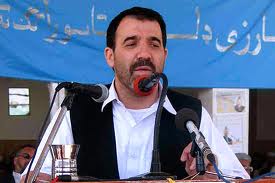I’m sorry I hadn’t learned of The Conjecturer until today. A blog – on initial reading – mostly about public affairs and political science by Joshua Foust and Dan Allen. I was moved by an excerpt from, and Foust’s review of, Rosanne Klass’s Land of the High Flags: Afghanistan When the Going Was Good.
From Klass:
What was lost could never be truly restored. The land had been depopulated, its people were dead, fled, or enslaved… The scholars were gone, the artists were gone, the poets, the heroes, the kings were gone, the land was stripped of life, the fields were ruined and barren. My horrors die with me, yours with you, but such horrors as these are ineffaceable, and heal, when they heal, like an amputation.
From Foust’s post:
What comes out the strongest, perhaps unintentionally, is grief. As the above passage indicates, Afghanistan has a particularly tragic past, an almost continuous record of horrendous loss and catastrophic destruction over the history of Man—what’s worse, such devastation was wrought by the hand of Man, and not Nature. It is the story of a land eternally torn back and forth by its more powerful neighbors (except for the brief, glorious Moghul empire), even if the first three-quarters of the 20th century were particularly calm.
Equally strong in Ms. Klass’ book, however, is the overwhelming sensation of beauty. Afghanistan is, she says, the face of the world—it’s people are of all colors and ethnicities (though, of course, Gul Baz Khan is worthy of particular merit). The landscape is unforgiving and painstakingly beautiful; at one point her endless commentaries upon the “glittering crystal landscape” of the mountains outside Jalalabad after a snowstorm prompt her husband to harshly rebuke her in recognition of the very real danger they were in of plummeting off a cliff to their deaths. Her description of the Buddhas of Bamiyan are of a similar ilk, as were the recordings of her trips into Paghman, Laghman, the Hazarajat, Charikar, and Bagram. Even in desolation, Afghanistan is a land of haunting beauty.
Foust is also a regular contributor to Registan
, which “covers Eurasian politics and news, seeking to draw more attention to issues and news rarely covered in much depth, if at all, by Western media. Our focus is primarily on the former Soviet Republics of Central Asia and the Caucasus, with an eye to domestic politics, relations with with rest of the world, and foreign policy as well as the occasional report on pop culture.”
From The Conjecturer.
 Tweet
Tweet ![]() As reported in The New York Times, Christian Science Monitor, and elsewhere, Ahmed Wali Karzi was killed by Sardar Mohammed. Mr. Mohammed, who is described as “an associate,” was a commander of security posts south of Kandahar. He was reported killed by Mr. Karzai’s bodyguards. The late Mr. Karzai had been linked to the drug trade and corrupt security companies. The Christian Science Monitor sited Wikileaks here as quoting official US concern regarding Ahmad Karzi.
As reported in The New York Times, Christian Science Monitor, and elsewhere, Ahmed Wali Karzi was killed by Sardar Mohammed. Mr. Mohammed, who is described as “an associate,” was a commander of security posts south of Kandahar. He was reported killed by Mr. Karzai’s bodyguards. The late Mr. Karzai had been linked to the drug trade and corrupt security companies. The Christian Science Monitor sited Wikileaks here as quoting official US concern regarding Ahmad Karzi.